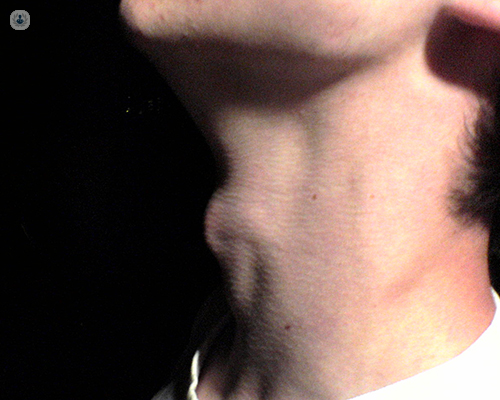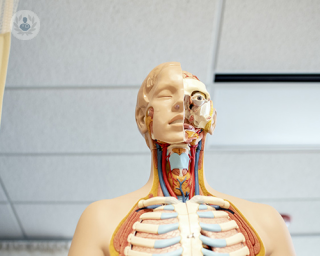What is oesophageal cancer?
Oesophageal cancer is a type of cancer that affects the oesophagus (gullet or food pipe), which is the long tube that carries food from the throat to the stomach. It occurs when abnormal cells grow in an uncontrollable way. It is more common in people in their 60s and 70s and occurs in men more than women.

What are the symptoms of oesophageal cancer?
The symptoms of oesophageal cancer include:
- Difficulty in swallowing (dysphagia) – this feels like a pain or burning sensation in the throat or chest
- Indigestion – occurs when acid from the stomach goes back into the oesophagus
- Heartburn – which is a burning chest pain after eating
- Weight loss – follows as a result of not being able to eat food because of the pain
- Pain in the throat - and behind the breastbone
- A persistent cough
- Dark poo – faeces may be almost black if the oesophagus bleeds from cancer
What are the causes of oesophageal cancer?
The exact cause is unknown but persistent gastro-oesophageal reflux disease (GORD), smoking, excessive alcohol consumption, being overweight and having an unhealthy diet are risk factors for the disease.
How is oesophageal cancer diagnosed?
The cancer is diagnosed using an endoscopy, which allows the doctor to see inside the oesophagus. The small, thin tube with a camera and light on the end is passed into the mouth and down towards the stomach. Sample tissues are removed so that they can be checked under a microscope.
What are the treatments for oesophageal cancer?
The treatment plan for oesophageal cancer depends on where in the oesophagus the cancer is and whether it is a squamous cell carcinoma or an adenocarcinoma.
If it is diagnosed during an early stage, it may be possible to cure it with chemoradiotherapy or by treating with chemotherapy to first shrink it, followed by surgical removal of the affected area of the oesophagus.
If the cancer is diagnosed at a later stage, cure is often not achievable but chemotherapy, sometimes in combination with targeted therapies such as immunotherapy, can be used to keep cancer under control and relieve symptoms
What’s the outlook for oesophageal cancer?
The outlook depends on the stage of oesophageal cancer. It depends on how far the disease has spread, the age, and the general health of the patient.
04-28-2017 10-25-2023Oesophageal cancer
Professor Marco Gerlinger - Medical oncology
Created on: 04-28-2017
Updated on: 10-25-2023
Edited by: Conor Lynch
What is oesophageal cancer?
Oesophageal cancer is a type of cancer that affects the oesophagus (gullet or food pipe), which is the long tube that carries food from the throat to the stomach. It occurs when abnormal cells grow in an uncontrollable way. It is more common in people in their 60s and 70s and occurs in men more than women.

What are the symptoms of oesophageal cancer?
The symptoms of oesophageal cancer include:
- Difficulty in swallowing (dysphagia) – this feels like a pain or burning sensation in the throat or chest
- Indigestion – occurs when acid from the stomach goes back into the oesophagus
- Heartburn – which is a burning chest pain after eating
- Weight loss – follows as a result of not being able to eat food because of the pain
- Pain in the throat - and behind the breastbone
- A persistent cough
- Dark poo – faeces may be almost black if the oesophagus bleeds from cancer
What are the causes of oesophageal cancer?
The exact cause is unknown but persistent gastro-oesophageal reflux disease (GORD), smoking, excessive alcohol consumption, being overweight and having an unhealthy diet are risk factors for the disease.
How is oesophageal cancer diagnosed?
The cancer is diagnosed using an endoscopy, which allows the doctor to see inside the oesophagus. The small, thin tube with a camera and light on the end is passed into the mouth and down towards the stomach. Sample tissues are removed so that they can be checked under a microscope.
What are the treatments for oesophageal cancer?
The treatment plan for oesophageal cancer depends on where in the oesophagus the cancer is and whether it is a squamous cell carcinoma or an adenocarcinoma.
If it is diagnosed during an early stage, it may be possible to cure it with chemoradiotherapy or by treating with chemotherapy to first shrink it, followed by surgical removal of the affected area of the oesophagus.
If the cancer is diagnosed at a later stage, cure is often not achievable but chemotherapy, sometimes in combination with targeted therapies such as immunotherapy, can be used to keep cancer under control and relieve symptoms
What’s the outlook for oesophageal cancer?
The outlook depends on the stage of oesophageal cancer. It depends on how far the disease has spread, the age, and the general health of the patient.


Oesophageal cancer: how curable is the disease and what are my treatment options?
By Professor Bijendra Patel
2024-12-14
In the UK, approximately 8,200 people get diagnosed with oesophagal cancer every year. Although that figure isn't as high as other types of cancer, experts have seen a gradual increase in cases, especially in the west. So, what's causing this rise? Prof Bijendra Patel, one of our top upper GI and laparoscopic surgeons from London, explains what causes oesophagal cancer and how it's treated. See more


Oesophageal cancer: Your questions answered
By Dr Sameer Zar
2024-12-14
In the UK, more than 9,200 people are diagnosed with oesophageal cancer each year, which is a cancer that causes extreme difficulty when it comes to swallowing food and even liquids. Here, renowned consultant gastroenterologist Dr Sameer Zar provides an expert insight into oesophageal cancer, including what changes the cancer causes in the body, and how the cancer is diagnosed and treated. See more


Oesophageal cancer: early signs and survival rate
By Mr Krishna Moorthy
2024-12-14
Persistent acid reflux is a risk factor in developing oesophageal cancer. We've asked one of our top surgeons Mr Krishna Moorthy to explain the early signs of the disease, the survival rate and whether it is curable. See more


Oesophageal cancer: what is it and can it be treated?
By Dr Aathavan Loganayagam
2024-12-10
Oesophageal cancer is a rare type of cancer that grows in your oesophagus (the 'food pipe', or tube) that leads from the throat to the stomach. The earlier oesophageal cancer is diagnosed and treated, the better the outcome. So, how is this difficult and challenging type of cancer dealt with? Dr Aathavan Loganayagam, a leading gastroenterologist, presents a concise guide about oesophageal cancer. See more
Experts in Oesophageal cancer
-
Professor Muntzer Mughal
SurgeryExpert in:
- Oesophageal cancer
- Gastric cancer surgery
- Gallbladder surgery
- Dysphagia
- Tracheoesophageal fistula (TOF)
- Hiatal hernia surgery
-
Mr Krishna Moorthy
SurgeryExpert in:
- Acid reflux
- Bariatric surgery
- Oesophageal cancer
- Gastric cancer surgery
- Hernia
- Laparoscopy
-
Mr Ashish Rohatgi
SurgeryExpert in:
- Oesophageal cancer
- Gastric cancer surgery
- Gallstones
- Acid reflux
- Hiatal hernia
- Hernia
-
Mr P S Jambulingam
SurgeryExpert in:
- Weight loss
- Hiatal hernia surgery
- Gallstones
- Inguinal hernia
- Gastric cancer surgery
- Oesophageal cancer
-
Mr Nima Abbassi-Ghadi
SurgeryExpert in:
- Acid reflux
- Oesophageal cancer
- Gallstones
- Hernia
- Endoscopy
- Laparoscopy
- See all

Amethyst: The Queen Square Neuroscience Health Centre
Amethyst: The Queen Square Neuroscience Health Centre
42-43 Queen Square London WC1N 3AQ
No existe teléfono en el centro.
By using the telephone number provided by TOP DOCTORS, you automatically agree to let us use your phone number for statistical and commercial purposes. For further information, read our Privacy Policy
Top Doctors

Bath Clinic - part of Circle Health Group
Bath Clinic - part of Circle Health Group
Claverton Down Road, Combe Down, Bath BA2 7BR
No existe teléfono en el centro.
By using the telephone number provided by TOP DOCTORS, you automatically agree to let us use your phone number for statistical and commercial purposes. For further information, read our Privacy Policy
Top Doctors

The Harborne Hospital - part of HCA Healthcare
The Harborne Hospital - part of HCA Healthcare
Mindelsohn Way, B15 2FQ
No existe teléfono en el centro.
By using the telephone number provided by TOP DOCTORS, you automatically agree to let us use your phone number for statistical and commercial purposes. For further information, read our Privacy Policy
Top Doctors
-
Amethyst: The Queen Square Neuroscience Health Centre
42-43 Queen Square London WC1N 3AQ, Central LondonExpert in:
- Vascular Surgery
- Cancer pain
- Neurosurgery
- Neurology
- Medical Oncology
- Cancer Treatment
-
Bath Clinic - part of Circle Health Group
Claverton Down Road, Combe Down, Bath BA2 7BR, BathExpert in:
- Clinical analysis
- Cancer
- Breast Cancer
- Prostate Cancer
- Cardiology
- Cataracts
-
The Harborne Hospital - part of HCA Healthcare
Mindelsohn Way, B15 2FQ, BirminghamExpert in:
- Digestive
- Cancer
- Orthopaedic surgery
- Thoracic Surgery
- Diagnostic Imaging
- Obstetrics and Gynaecology
- See all
- Most viewed diseases, medical tests, and treatments
- Nystagmus
- CAR-T cells
- Hormone therapy
- Migraine
- Hodgkin's lymphoma
- Weight loss injections
- Genetic testing
- Nipple discharge
- Abdominal pain
- Endovenous laser treatment (EVLA)








